Foods to avoid eating when you're pregnant
Knowing what you can and can't eat when you're pregnant can be a bit of a minefield. We give you the low-down on foods to enjoy... and avoid
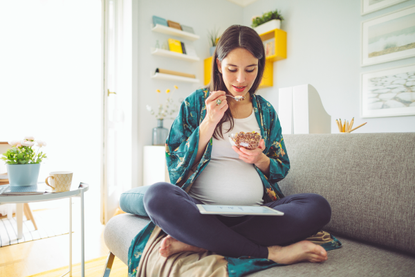

Most food and drink is perfectly safe to consume when you're pregnant but there are definitely some you should try to avoid.
If you're suffering from morning sickness you may be exerting some caution about what you're eating already. There are many foods you should eat when pregnant and a varied, healthy diet (and listening to your pregnancy cravings) will also give you and your baby all the nutrients you need during pregnancy.
According to the NHS, there are some foods that have the potential to harm you and your unborn baby if they're consumed not fully cooked or in large quantities. While others will make you unwell, leading to harmful conditions such as listeriosis or toxoplasmosis infection. However, as important as it is to be aware of this, NHS advice also suggests not worrying too much if you've consumed one of these foods and only go to the doctor if you feel unwell after doing so.
To help you navigate the landscape of pregnancy and eating, we've put together this handy guide on all the foods to avoid when you're pregnant and why.
These are the foods to avoid when pregnant...
Eggs
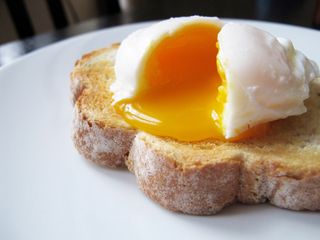
Do eat: Eggs are really good for you, so they're not one of the foods to completely avoid when pregnant. It used to be thought that runny eggs were too risky for pregnant women, because of the risk of salmonella, but recent advice has given them the green light. Eggs with the red British Lion stamp now carry a "very low" risk of salmonella, a report by the government's Advisory Committee on the Microbiological Safety of Food (ACMSF) says, meaning they're safe for all groups of people to eat.
Avoid: One of the foods to avoid when pregnant is raw or partially cooked eggs that are not British Lion stamped. Duck, goose or quail eggs should also be avoided, unless cooked thoroughly until the whites and yolks are solid.
Why? Raw eggs that aren't approve by the red British lion stamp have the potential to cause salmonella food poisoning.
GoodtoKnow Newsletter
Parenting advice, hot topics, best buys and family finance tips delivered straight to your inbox.
Cheese
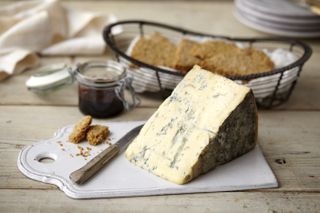
Do eat: Hard cheese, even if it's made from unpasteurised milk, as bacteria is less likely to grow in it. Cheese, like all dairy products, is a good source of calcium, which gives your baby strong bones. Cottage cheese, mozzarella, feta, cream cheese, paneer, ricotta, halloumi, goat's cheese and processed cheeses are all OK, as long as they're made with pasteurised milk.
Avoid: Soft cheeses such as brie, camembert and others with a mould rind, as well as Danish blue, Roquefort and gorgonzola. However, Lex Shamis,an Integrative Health Coach & Trainer at P.Volve adds that humans have no nutritional need for cheese, and most of the population is actually lactose intolerant.
'If you are going to eat cheese, do so in moderation and avoid soft and unpasteurised cheese.'
Why? Soft cheeses are made with mould and may contain a bacteria called listeria. There is a small risk of listeria causing an infection called listeriosis, which in severe cases could lead to miscarriage, severe illness and in rare cases, stillbirth.
If you're worried about your calcium intake, Lex explains that you can get your calcium from 'dark leafy greens, nuts, seeds, and legumes.'
'Yogurt, especially kefir, is full of probiotics that promote good bacteria in the gut; if you eat yogurt, it must be organic to ensure you aren’t getting artificial hormones given to cows. Many clean brands make vegan coconut-based yogurts that are full of good probiotics. I recommend Culina; it’s also women-owned and comes in glass containers!'
Milk
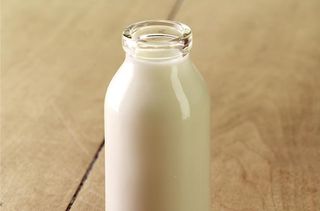
Do drink: Milk is a great source of calcium, which helps give your baby strong bones. Make sure you drink pasteurised milk as pasteurisation kills bacteria such as listeria. Avoid: Raw (unpasteurised) milk, including unpasteurised goats' or sheep's milk, or food that is made from raw milk, such as soft goat's cheese. If only green-top milk is available, boil it first. Ice cream is usually OK as it's made from pasteurised milk. So, overall, milk isn't really one of the foods to avoid when pregnant. It's just the type. Why? Raw milk may contain a bacteria called listeria, which can cause listeriosis. Although this infection is rare, it can lead to miscarriage, severe illness and in rare cases, stillbirth.
Foods to avoid when pregnant: Red meat, liver and pâté
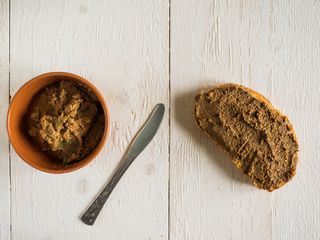
Do eat: Well-cooked red meat, as it's a good source of protein and iron. In some countries, women are advised against eating cold cured meats or smoked meats, because there's a low risk of listeria infection. In the UK this advice isn't given, but if you'd prefer not to eat them, don't.
Lex explains: 'Meat is a controversial topic all around.
Aim for meat that's pasture finished.
'Pasture-raised without finished means the livestock is raised outside but transferred to confinement for the remainder of its life. This increases the release of stress hormones that you would in turn consume. Depending on where you live all these boxes may be hard to check. However, the point is to avoid factory-farmed meat which is harmful for so many reasons; for the animals, environment, and body.'
Avoid: Raw or undercooked meat is definitely one of the foods to avoid when pregnant. There should be no trace of pink or blood. Take particular care with sausages and mince. Cooking meat at high temperatures will kill the bacteria. You should also say no to all pates - not just meat and fish ones, but also veggie. Liver and liver pates are not advised either, as liver contains high levels of vitamin A, which may harm your baby. For the same reason, high-dose vitamin supplements, fish liver oil supplements and any other supplements containing vitamin A should be off your shopping list during pregnancy.
Why? Meat may contain a bacteria that can cause toxoplasmosis, an infection that can damage your baby. Pate can contain a bacteria called listeria. Although it's rare, listeria can cause an infection called listeriosis, which in extreme cases may lead to miscarriage, stillbirth and severe illness.
Fish and shellfish
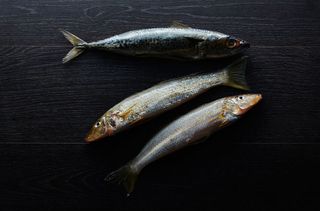
Do eat: White fish, as it's low in fat but has plenty of good protein and vitamins, as well as cooked shellfish - a good source of iodine and zinc. Avoid: Shark, marlin and swordfish. And limit yourself to only two portions a week of oily fish, such as sardines, trout, salmon, mackerel and fresh tuna (canned tuna is ok, but no more than 4 cans per week). Don't eat raw shellfish, but it's fine if it's cooked. In some countries, pregnant women are told to avoid smoked fish because it may contain listeria bacteria. In the UK this advice isn't given, but if you'd prefer not to eat it, don't. Why? These fish contain high levels of mercury which can, if eaten in large amounts, damage the nervous system of an unborn baby. If you want to eat shellfish, make sure it's fresh as it's a common cause of food poisoning.
Alcohol

Do drink: Lots of water, to keep your body well hydrated. Fruit juice is a good source of vitamin C too. Avoid: Binge drinking, although some medical experts say that 1 or 2 units of alcohol (1 unit = 1 beer or 1 glass of wine) per week is fine. Many women steer clear of alcohol of any sort while they're pregnant or even when they're trying to get pregnant - this is because it's difficult to know exactly when you've conceived so it's better to try to avoid alcohol altogether. Why? Alcohol - especially in large quantities - can seriously affect your baby's development.
Unwashed fruit, vegetables and salad
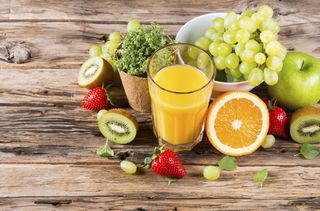
Do eat: Fruit, veg and salads. Of course, these are highly recommended for pregnant women as they're packed with nutrients and form the base of a healthy diet. But make sure they're well washed, especially if you're buying from a market stall, where produce has come straight from the field. Avoid: Unwashed fruit, vegetables and salad are one the list of foods to avoid when pregnant. Why? Traces of soil could contain toxoplasma, a parasite that can cause toxoplasmosis. For the same reason, pregnant women are told to avoid changing cat litter trays unless they're wearing gloves.
Caffeine - coffee and tea

Do drink: Herbal or fruit teas (but no more than 4 cups a day per NHS guidelines). These often contain vitamin C and natural ingredients. Instead of your usual cuppa, try decaf coffee. Avoid: Caffeine - try to avoid any more than 200mg of caffeine. (One mug of instant coffee has 100mg, filter coffee 140mg and tea 75mg.) Remember that caffeine is also found in chocolate (50g bar dark chocolate has 50mg, milk chocolate 25mg) as well as some soft and energy drinks, so check the label! And check cold and flu remedies, as these can also contain caffeine, although seek medical advice before taking any form of medicine while pregnant. Why? High levels of caffeine can cause babies to have a low birth weight. Too much caffeine can also, in rare cases, cause a miscarriage.
Vitamin A supplements
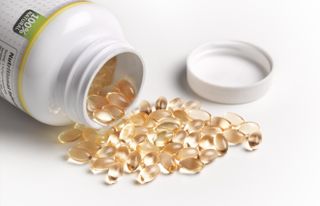
Do eat: Foods with vitamin A in them. These include yellow fruit and vegetables, in moderate amounts. You should be able to get all the vitamins you require from a healthy diet, with around fruit and vegetables, rather than having to take any additional vitamin supplements. Avoid: High-vitamin supplements in general but particularly vitamin supplements containing vitamin A. Why? Vitamin A is considered by the NHS to cause potential birth defects in unborn babies, so medical health professionals advise not consuming large amounts of the vitamin.
Guidelines often change, so visit nhs.uk to check out the latest advice.
20 years ago, women were encouraged to eat lots of liver for its vitamin A. But now it's not recommended and, more recently, pregnant women were told not to eat peanuts if there was a history of asthma, eczema or hay fever in the family, but no link has been proved.
Processed food
Do eat: Lex recommends eating organic cooked foods and use non plastic or BPA free refillable water bottles and glass tupperware.
Avoid: 'Exposure to environmental toxins and processed foods that contain bacteria, heavy metals, and BPA commonly found in colds cuts, food packaging, and water bottles,' says Lex.
Plus, processed food can often be very calorific. Lex says that 'eating for two is a No-No.
Why: Lex explains that this can lead to endocrine disruption increasing the risk of birth defects / (congenital disabilities). 'In non-pregnant women, environmental toxins contribute to the toxic load in the body, causing many issues that contribute to rising rates of infertility.'
As for notion of 'eating for two', Lex says that it increases your blood pressure leaving you more susceptible to pregnancy and birth complications.
'For example, excess intake could lead to gestational diabetes. Remember, your blood volume is already going up by a half, and you are trying not to let your heart rate become too high. Excess food and exercise cause a spike.' According to Dr. Aviva Romm, the third-trimester extra caloric intake needed is equivalent to half a sandwich.
Undercooked ready meals
Do eat: 'It is ok to eat pre-cooked frozen meals during pregnancy. However, you must meticulously follow cooking and storage instructions,' says Lex. She adds: 'Store meals in your freezer as soon as you get home, making sure your freezer is cold enough (18 degrees C or less). Make sure it’s cooked all the way through (centre of the dish should be hot!). Plus make sure you check the expiration date!'
Avoid: Handling food with unwashed hands. Thoroughly wash hands before and after handling food.
Why: Undercooked ready meals could lead to food being contaminated by Listeria bacteria. This can be seriously harmful to your fetus, even leading to miscarriage or death at childbirth.
Unpasteurised fruit juice
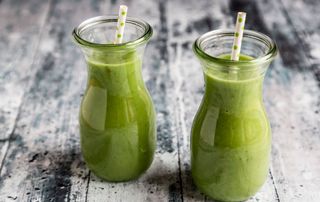
Do eat: Lex says it's best to buy organic fruits, wash and cut them up yourself and put in a blender for a safe and cleaner experience. Plus they are high in fibre.
Avoid: Avoid unpasteurised pre-packaged juice.
Why: 'It could contain harmful bacteria and foodborne illness like Listeria.'
Can I eat peanuts when I'm pregnant?
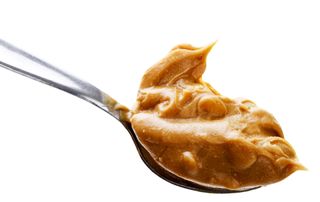
Do eat: Lex says that according to the Cleveland Clinic, one of America's top 5 hospitals, peanut butter is safe. She adds that two tablespoons of peanut butter are approximately 200-300 calories. 'In the first trimester and second trimester, this would count as your additional caloric intake for the day.'
Avoid: 'Everyone reacts differently, and nuts are known to increase inflammation. Nuts also carry moulds considered toxins; buy organic from clean brands, preferably in a glass jar. Sorry, Skippy.'
Lex adds: 'Many nut butters contain fillers like palm oil and sugar. These are not good for your body. Pick your PB wisely—there are so many delicious organic brands, key in pregnancy, without any additives!'
Why: Inflammatory conditions also include asthma and eczema, so if you have a history of these, you might want to avoid nuts or try less inflammatory nuts such as walnuts.
As for the high calorie count, Lex explains that this is about moderation and mindfulness.
'Choose how and where you are getting your extra intake, which supports your baby’s development. If you want a peanut butter sandwich or want to have a spoonful on your apple and banana, go for it! But stop yourself from eating five more servings from the Jar! Make sure your nuts are unsalted as salty foods cause increased water retention that could elevate blood pressure.'

Freelance writer Lucy Gornall is the former health and fitness editor for various women’s magazines including Woman&Home Feel Good You. She has previously written for titles including Now, Look and Cosmopolitan, Woman, Woman's Own, Woman's Weekly and Chat. She lives and breathes all things fitness.
-
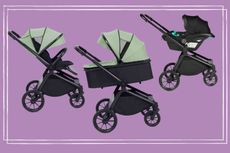 What is a travel system? Baby gear experts explain how they work - and what’s included
What is a travel system? Baby gear experts explain how they work - and what’s includedExperts decode what is a travel system and offer tips on how to find the best one for you
By Charlotte Duck Published
-
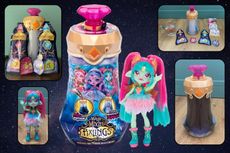 Magic Mixies Pixlings are a bestseller - but are they worth the money? We put this toy through its paces to find out
Magic Mixies Pixlings are a bestseller - but are they worth the money? We put this toy through its paces to find outMagic by name and magic by nature? We review Magic Mixies Pixlings to see if it lives up to the hype
By Sarah Handley Published